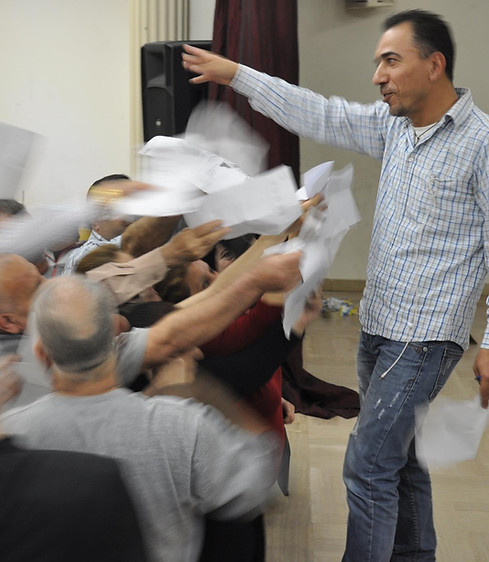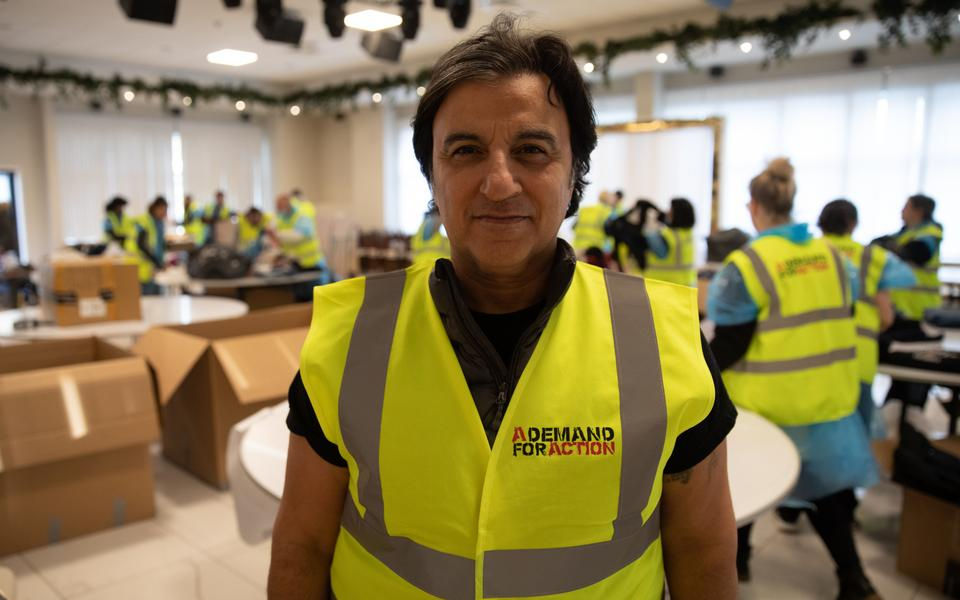
Too Long in Limbo: We Call for Concrete Action on Behalf of Christian Survivors of Genocide Now Trapped in Lebanon
The financial meltdown in Lebanon has caused significant hardship for the people.
Eighty percent of the population live below the poverty line. Access to healthcare is a major challenge. Since 2013 St. Ephrem Healthcare Center has treated more than 50,000 cases. The management and staff believe that everyone has a right to a certain level of healthcare.
A Demand for Action (ADFA) a Sweden-based international advocacy and aid organization is calling for the UNHCR and the governments of refugee-welcoming countries to take urgent action to relocate over 100 Christian refugee families trapped in Lebanon with no citizenship rights and living in extreme poverty and hardship.
Since fall of 2004, they fled from their homes in Iraq and Syria, from ethnoreligious cleansing perpetrated against them by ISIS and other terror organizations, and from war crimes, crimes against humanity, and even genocide, as recognized by the European Parliament and similar bodies. They reached Lebanon after long and dangerous journeys, only to find themselves living in a country where they have no rights, and no access to employment, education, and adequate healthcare.
All of them have applied for resettlement in a third country where they can make a decent living and carve out a better future for themselves and their children. However, the application process is unacceptably long, and some have been waiting as long as ten years for any movement on their cases. Others have been refused with little to no explanation, but are not giving up, and keep applying to other countries. They are forced to live in what can only be described as limbo, sacrifice their and their children’s future in pursuit of safety.
ADFA recently completed a survey of over 100 of these refugees to shed light on their situation.


The below incorporated some statistics ADFA compiled. The data provides an overview of the number of those interviewed, the status of their applications, the length of time they have been waiting for processing, among others.
1. Total interviewees: 136
2. Average number of applications for visas or refugee status per family: 1.8 Applications per family consisting of 1 to 7 members. Average of 2.25 members per family.
3. Maximum number of applications: 7
4. Average refusal rate per family: 109.6 %
5. Percentage of interviewees currently waiting for one or more applications. 72.06%
6. Percentage of interviewees approved 0.74%. In fact, only one family was approved.
7. Percentage of interviewees who have given up 32.35%


On August 2, 2022, ADFA interviewed and registered 136 refugee families from Iraq and Syria. They are all Assyrians/Chaldeans/Syriacs and Armenians who were targeted for extermination by ISIS terrorists. ADFA interviewed them to get the human stories behind these numbers and heard heartbreaking tales of widows who lost their husbands to ISIS atrocities, and of children and families suffering from lack of adequate food and other assistance for their daily needs. The economic meltdown in Lebanon is adding to their suffering. Amar Sabri, a member of ADFA’s Board of Directors, traveled from Sweden to Lebanon to help ADFA volunteers to distribute food and other urgently needed supplies. ADFA volunteers distribute food to over 1,000 families, and do this at least twice a year.
ADFA would have been able to interview more than the 136 families, but they wanted to start with a smaller sample.
All the survey respondents told ADFA that returning to their homelands is not an option for them. Both Syria and Iraq still present formidable challenges for minorities and indigenous groups, despite the ‘defeat’ of ISIS. For example, Christians living in a compound for internally displaced people in Baghdad, the Virgin Mary Compound, were ordered to leave by the end of this month and are facing the prospect of homelessness in harsh winter conditions. All the families in Baghdad fled from ISIS to the Northeast of Iraq in 2014 and have not been able to return to their homes.
Such incidents make it clear that the refugees trapped in Lebanon have no incentive to return to their countries.
ADFA is committed to being a voice for these voiceless people. ADFA is working diligently to help the persecuted families to survive their harsh lives during their transit period, but the need is enormous and ADFA, as an organization composed entirely of volunteers and wholly dependent on private donations, is unable to meet the demand.
Besides the work with refugees from Syria and Iraq, ADFA responds to humanitarian crises in other countries as the need arises. ADFA sent 100 tons of winter clothing to refugees fleeing Artsakh in the aftermath of the 2020 war. Between March 2 and June 5, 2022, ADFA ran a refugee relief center in Poland and relocated over 3,200 Ukrainians to Sweden and helped 1,800 to move to Spain. ADFA also distributed 500 tons of food and medical equipment to war-torn areas of Ukraine.
ADFA is now asking for a more permanent solution to the enormous problems that the Assyrian/Chaldean/Syriac refugees in Lebanon face daily. ADFA is calling on the US State Department and other governments, and UNHCR to take note of the protection needs of this vulnerable group of people, and take steps immediately to:
1. Facilitate their resettlement to countries where they can have an opportunity to rebuild their lives.
2. To assist respected aid organizations operating in Lebanon with funds to provide food and other survival needs of these people while they are waiting to be granted visas and residence permits in other countries.
3. To facilitate the transfer of money to Lebanon for humanitarian purposes.
ADFA articulated our appeal for help at a press conference at the IRF Summit in Washington DC on June 30, 2022. ADFA is now reiterating it by appealing to the international community more broadly.
For further information on ADFA and its work with refugees, please feel free to email: info@ademandforaction.com and visit our website: www.ademandforaction.com. You will find several media articles and four documentary films that we have co-produced.


Nuri Kino’s insightful and pertinent speech at the IRF Summit in Washington DC on June 30, 2022.
During the summer of 2014, the ethnoreligious cleansing of Assyrians / Chaldeans / Syriacs and other Christians in Syria and Iraq escalated to a full-scale genocide.
Already, a decade prior to that, in fall 2004, the first beheading of a Christian took place in front of terrorist’s camera, a young man, Reemon Shamoun was forced to look straight in to the lens while, knowing, with panicked eyes, he was going to be killed. The knife was not sharp enough, so the perpetrators had to rip his head while cutting it. Then they emptied his head and body of blood.
In the upcoming years, hundreds of churches were destroyed, many of them during Mass, blowing up the worshippers into pieces. Thousands of Christians were kidnapped. Some families had the opportunity to pay huge ransoms to get their loved ones back. Others also paid but received their family members dead.
For a decade, we begged world leaders to listen to our plight, to the cry from the cradle of civilization, the Assyrians, the Babylonians, the Arameans, but nothing was done to stop the cleansing from their homeland of thousands of years.
Meanwhile, a monster was growing, terrorist groups came together and built ISIS, Islamic State in Iraq and Syria - Daesh. A murderous and pedophile Islamic cult. In summer 2014 ISIS gave Christians an ultimatum: “Convert to Islam, pay taxes, run or die”.
Our organization, A Demand for Action started as a campaign on social media - to alert the world about the genocide.
A couple of months ago, on June 9, 2022, 8 years later, Christian survivors of the ISIS genocide who are been trapped in limbo in Lebanon for many years, rallied outside the UN office in Beirut begging for help to be resettled to a third country. And today, in a couple of hours they will beg again, for help outside the UN office in Beirut, which they believe is their only savior. When we asked the officers at the UNHCR what they thought of the protests, the answer was that the whole world is hurt.
A Demand For Action conducted a survey and asked the people who rallied about their situation. Their responses were overwhelmingly consistent. They feel forgotten by the entire world.
While we know that all Iraqis and Syrians, and especially Yazidis have been affected by the wars in their countries, our report focuses on Christians (Assyrians / Chaldeans / Syriacs and Armenians).
1,3 Million Christians lived in Iraq before the fall of Saddam. Today not even 200,000 are left. Where are the others? Under what conditions do these Christian refugees in Lebanon, Turkey and Jordan live?
And before the outbreak of the war in Syria there were 1.5 million Christians. 600,000 have fled the country. Where are they?



